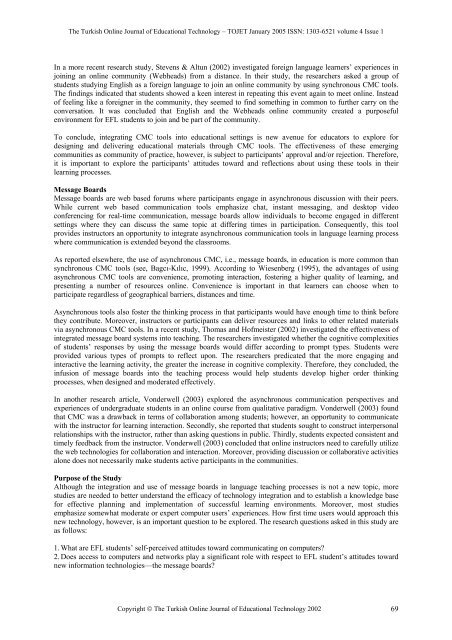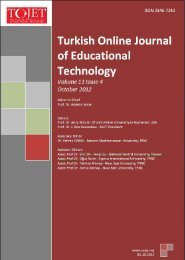Age - TOJET the Turkish online journal of educational technology
Age - TOJET the Turkish online journal of educational technology
Age - TOJET the Turkish online journal of educational technology
Create successful ePaper yourself
Turn your PDF publications into a flip-book with our unique Google optimized e-Paper software.
The <strong>Turkish</strong> Online Journal <strong>of</strong> Educational Technology – <strong>TOJET</strong> January 2005 ISSN: 1303-6521 volume 4 Issue 1<br />
In a more recent research study, Stevens & Altun (2002) investigated foreign language learners’ experiences in<br />
joining an <strong>online</strong> community (Webheads) from a distance. In <strong>the</strong>ir study, <strong>the</strong> researchers asked a group <strong>of</strong><br />
students studying English as a foreign language to join an <strong>online</strong> community by using synchronous CMC tools.<br />
The findings indicated that students showed a keen interest in repeating this event again to meet <strong>online</strong>. Instead<br />
<strong>of</strong> feeling like a foreigner in <strong>the</strong> community, <strong>the</strong>y seemed to find something in common to fur<strong>the</strong>r carry on <strong>the</strong><br />
conversation. It was concluded that English and <strong>the</strong> Webheads <strong>online</strong> community created a purposeful<br />
environment for EFL students to join and be part <strong>of</strong> <strong>the</strong> community.<br />
To conclude, integrating CMC tools into <strong>educational</strong> settings is new avenue for educators to explore for<br />
designing and delivering <strong>educational</strong> materials through CMC tools. The effectiveness <strong>of</strong> <strong>the</strong>se emerging<br />
communities as community <strong>of</strong> practice, however, is subject to participants’ approval and/or rejection. Therefore,<br />
it is important to explore <strong>the</strong> participants’ attitudes toward and reflections about using <strong>the</strong>se tools in <strong>the</strong>ir<br />
learning processes.<br />
Message Boards<br />
Message boards are web based forums where participants engage in asynchronous discussion with <strong>the</strong>ir peers.<br />
While current web based communication tools emphasize chat, instant messaging, and desktop video<br />
conferencing for real-time communication, message boards allow individuals to become engaged in different<br />
settings where <strong>the</strong>y can discuss <strong>the</strong> same topic at differing times in participation. Consequently, this tool<br />
provides instructors an opportunity to integrate asynchronous communication tools in language learning process<br />
where communication is extended beyond <strong>the</strong> classrooms.<br />
As reported elsewhere, <strong>the</strong> use <strong>of</strong> asynchronous CMC, i.e., message boards, in education is more common than<br />
synchronous CMC tools (see, Bagcı-Kılıc, 1999). According to Wiesenberg (1995), <strong>the</strong> advantages <strong>of</strong> using<br />
asynchronous CMC tools are convenience, promoting interaction, fostering a higher quality <strong>of</strong> learning, and<br />
presenting a number <strong>of</strong> resources <strong>online</strong>. Convenience is important in that learners can choose when to<br />
participate regardless <strong>of</strong> geographical barriers, distances and time.<br />
Asynchronous tools also foster <strong>the</strong> thinking process in that participants would have enough time to think before<br />
<strong>the</strong>y contribute. Moreover, instructors or participants can deliver resources and links to o<strong>the</strong>r related materials<br />
via asynchronous CMC tools. In a recent study, Thomas and H<strong>of</strong>meister (2002) investigated <strong>the</strong> effectiveness <strong>of</strong><br />
integrated message board systems into teaching. The researchers investigated whe<strong>the</strong>r <strong>the</strong> cognitive complexities<br />
<strong>of</strong> students’ responses by using <strong>the</strong> message boards would differ according to prompt types. Students were<br />
provided various types <strong>of</strong> prompts to reflect upon. The researchers predicated that <strong>the</strong> more engaging and<br />
interactive <strong>the</strong> learning activity, <strong>the</strong> greater <strong>the</strong> increase in cognitive complexity. Therefore, <strong>the</strong>y concluded, <strong>the</strong><br />
infusion <strong>of</strong> message boards into <strong>the</strong> teaching process would help students develop higher order thinking<br />
processes, when designed and moderated effectively.<br />
In ano<strong>the</strong>r research article, Vonderwell (2003) explored <strong>the</strong> asynchronous communication perspectives and<br />
experiences <strong>of</strong> undergraduate students in an <strong>online</strong> course from qualitative paradigm. Vonderwell (2003) found<br />
that CMC was a drawback in terms <strong>of</strong> collaboration among students; however, an opportunity to communicate<br />
with <strong>the</strong> instructor for learning interaction. Secondly, she reported that students sought to construct interpersonal<br />
relationships with <strong>the</strong> instructor, ra<strong>the</strong>r than asking questions in public. Thirdly, students expected consistent and<br />
timely feedback from <strong>the</strong> instructor. Vonderwell (2003) concluded that <strong>online</strong> instructors need to carefully utilize<br />
<strong>the</strong> web technologies for collaboration and interaction. Moreover, providing discussion or collaborative activities<br />
alone does not necessarily make students active participants in <strong>the</strong> communities.<br />
Purpose <strong>of</strong> <strong>the</strong> Study<br />
Although <strong>the</strong> integration and use <strong>of</strong> message boards in language teaching processes is not a new topic, more<br />
studies are needed to better understand <strong>the</strong> efficacy <strong>of</strong> <strong>technology</strong> integration and to establish a knowledge base<br />
for effective planning and implementation <strong>of</strong> successful learning environments. Moreover, most studies<br />
emphasize somewhat moderate or expert computer users’ experiences. How first time users would approach this<br />
new <strong>technology</strong>, however, is an important question to be explored. The research questions asked in this study are<br />
as follows:<br />
1. What are EFL students’ self-perceived attitudes toward communicating on computers?<br />
2. Does access to computers and networks play a significant role with respect to EFL student’s attitudes toward<br />
new information technologies—<strong>the</strong> message boards?<br />
Copyright © The <strong>Turkish</strong> Online Journal <strong>of</strong> Educational Technology 2002 69
















